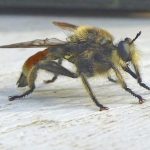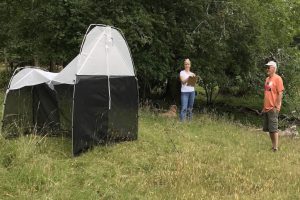The following is from the Goldstream Gazette, March 16, 2021
Metchosin study explores whether local insect populations follow global trends
A 2017 study found a 70 per cent decline in insect biomass over 27-year period in Germany
An entomologist has teamed up with 19 rural Metchosin homeowners to learn more about Greater Victoria’s insect volumes and see if the region’s trends match concerning ones emerging globally.
Neville Winchester, a University of Victoria professor and conservation biologist, receives around half a million flying insects that get collected from Metchosin properties every year. His study started in 2018 and will need about 10 years before he can start identifying the trends of what’s happening to insect biomass here.
“It’s really a biodiversity-driven project,” Winchester said. “Biodiversity is important to maintain ecosystem functioning and provide ecosystem services.”
The project was inspired by a 2017 study that found insect biomass had declined by 75 per cent over a 27-year period in 63 of Germany’s protected natural areas.
READ: Scientists decry death by 1,000 cuts for world’s insects
“We decided, ‘Hey we should start our own project and see if this is happening here in B.C.,’” Winchester said.
Metchosin was picked because of its “intact” natural areas and the interest from residents. Passive flight interception traps are set up to catch and collect flying insects. The citizen scientists then deliver the collections to Winchester every two weeks from May to October. The researcher splits the insects into about seven different groups and weighs the collections.
Winchester is establishing a baseline that will be key to seeing any trends that emerge over time. “Is it declining, is it staying somewhat stable or is it increasing?” he said.
Local insect populations are vital to the food we eat, the researcher said. “If insects started to drop out that were pollinators, who would pollinate food crops? If insects are dropping out, then that is not a good thing, so what are we doing to cause that or are there things we can be doing to reverse that.”
READ: Lack of bees, pollination limiting crop yields across U.S., B.C., study finds
The study is taking variables like weather, elevation and the area’s plant types into account. Winchester says a combination of factors will likely impact the insect population trends.
The professor meets regularly with each homeowner involved to talk about data he’s getting from their properties. Winchester said the Metchosin residents’ enthusiasm for the project means it’ll likely keep going for many years.
“They’re interested in the results and they’re interested in what’s happening on their property and what’s happening, in general in the district,” he said.
Winchester has spent much of his career in the canopies of massive old growth forests around Vancouver Island and the world — researching insect species and their ecological impact. The creatures may be small, but the role they play is not.“I think (people) care about it and they certainly should care about it.”
 See an earlier story on this https://www.goldstreamgazette.com/news/new-uvic-study-to-track-decline-of-insects-in-metchosin/https://www.goldstreamgazette.com/news/new-uvic-study-to-track-decline-of-insects-in-metchosin/
See an earlier story on this https://www.goldstreamgazette.com/news/new-uvic-study-to-track-decline-of-insects-in-metchosin/https://www.goldstreamgazette.com/news/new-uvic-study-to-track-decline-of-insects-in-metchosin/
